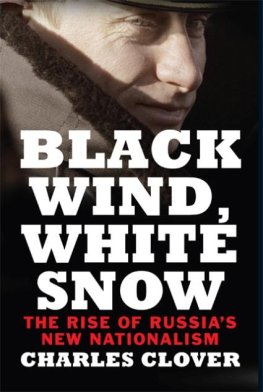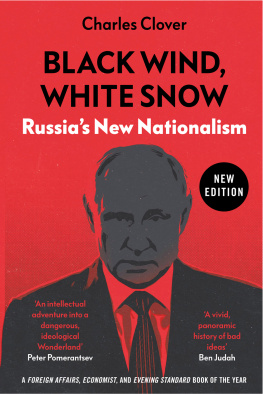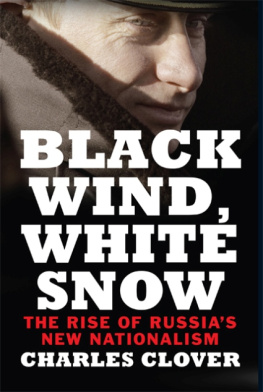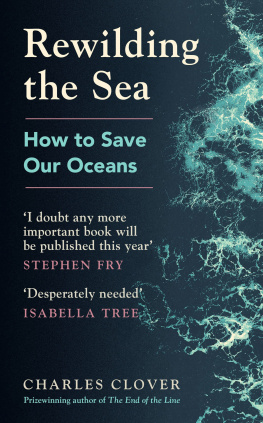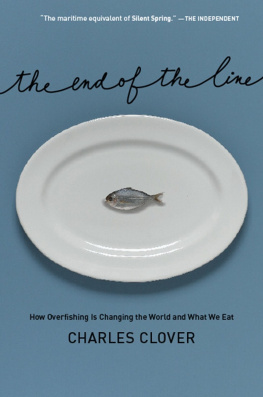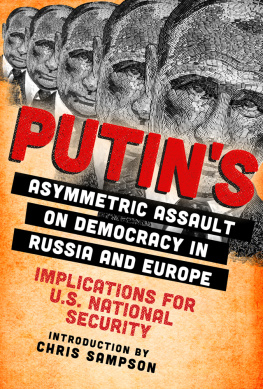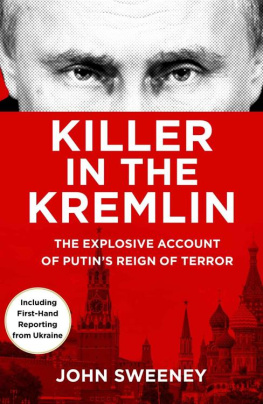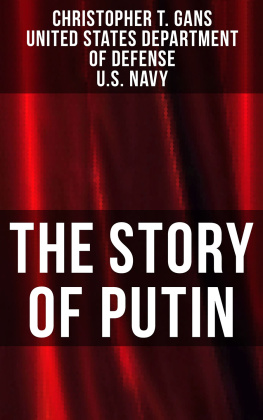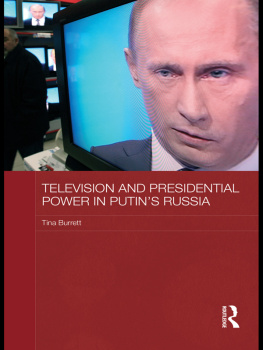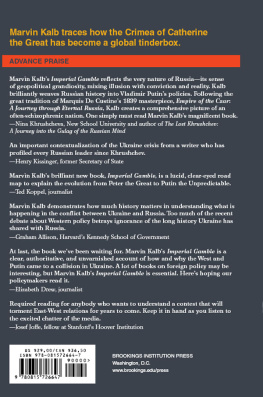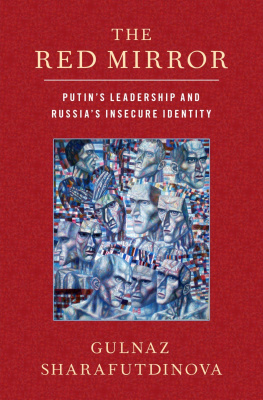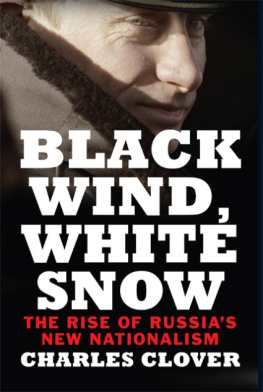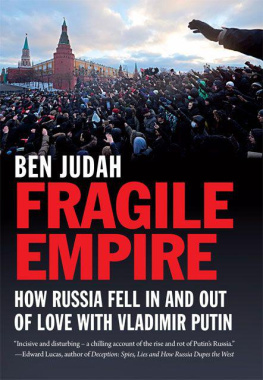Charles Clover
BLACK WIND, WHITE SNOW
THE RISE OF RUSSIAS NEW NATIONALISM
Now I held in my hands a vast methodical fragment of an unknown planets entire history, with its architecture and its playing cards, with the dread of its mythologies and the murmur of its languages, with its emperors and its seas, with its minerals and its birds and its fish, with its algebra and its fire.
Jorge Luis Borges


Map of Eurasia, first outlined by Sir Halford Mackinder in his The Geographical Pivot of History, and reproduced in Russian by Alexander Dugin in The Foundations of Geopolitics (1997).
This book grew out of a meeting I had in 1998, soon after I arrived in Ukraine as a rookie stringer for the Financial Times. After a few months of reporting from Kiev, the Foreign Ministry finally acceded to a request for an interview, putting forward their courtly, if rather severe, first deputy foreign minister, Anton Buteiko, to gently lobby me on some of my more persistent errors (its Lviv, not Lvov anymore) and to give me a bit of a steer politically.
Much of what he said was standard boilerplate about Ukraines partnership with Russia and its desire for integration with Euro-Atlantic structures two objectives that at the time did not seem incompatible. But towards the end of the meeting, he mentioned an interesting tidbit.
A book had been published in Russia a few months previously, called The Foundations of Geopolitics. Its author, Alexander Dugin, was known to have the backing of conservative Russian hardliners, said Buteiko, and the book was produced with the help of Russias Academy of the General Staff. It laid out plans for the dismemberment of Ukraine. It might be worth a read, he said, if I wanted to get an idea of what his former colleagues in Moscow were thinking.
The next day I went to the Lesya Ukrainka public library in Kiev and found a copy. (The book was not available in bookstores, for understandable reasons.) I was intrigued: on the cover was some sort of ancient Norse rune, plus a map of the former Soviet Union. And inside, sure enough, was a note thanking General Nikolay Klokotov, head of the department of strategy at the Academy of the General Staff, for his insightful analytical help with the project.
The book was an exposition of right-wing theories of nationalism; fascistic theories from interwar Nazis, like geopolitics; plus a political movement I had never heard of, known as Eurasianism. This appeared to describe a plan to put the Soviet Union back together again, en route to creating a world-dominating empire.
There was plenty to worry a Ukrainian foreign minister, including one passage that, in light of the events in Georgia and Ukraine over the past half-decade, deserves some attention:
One absolute imperative of Russian geopolitics is the total and unfettered control of Moscow over the entire length of the Black Sea coast stretching from Ukrainian to Abkhazian territory The north shore of the Black Sea should be exclusively Eurasian and centrally obey Moscow.
On my next visit to Moscow, I met Alexander Dugin, the books author, at his office in a public library across from the golden onion domes and secluded ponds of the Novodevichy Convent in Moscow. A former dissident, who cranked out his manifestos in dingy basements and on Xerox machines, Dugins search for freedom from totalitarian rule led him in a very different direction from many of his fellow Soviet-era intellectuals.
Russias salvation, Dugin believed, lay in turning back the tide of democratic liberalism, re-establishing repressive central control, and bringing to power a regime of patriots, beholden to an imperial concept of Russia, a multinational, multi-ethnic, multi-confessional, but distinctly Russian and distinctly non-Western geopolitical space Eurasia.
Dugins very existence is interesting, given the booming triumphalism which accompanied the end of the Cold War. He had spent his life wrestling with the chains of authoritarianism, only to embark on building a new type of authoritarianism when the old type finally fell. He reminded me of Shigalov, the character from Fedor Dostoevskys novel Demons who said: Starting from unlimited freedom, I arrive at unlimited despotism.
Dugin may have looked the part of a philosophy-crazed Dostoevsky-esque anchorite. But in fact he was a funny, hip and altogether likeable guy as well as being one of the most interesting, well-read intellectuals I have ever met. To this day I wonder: does he actually believe it or not? But I know that that is somehow irrelevant. Whether he is a true believer or is just playing a role, he carries both off equally well, flitting in and out of references to the occult, numerology, fascism, postmodernism and French cultural theory. But I was intrigued by the reference to the General Staff: in addition to being a conspiracy theorist, was Dugin actually part of a conspiracy? Or was he just a talented self-publicist? Dugins answer confirmed both possibilities: There are high-level people within the state who support these views.
When a piece of mine criticizing Dugin and his views ran in the arch-Atlanticist journal Foreign Affairs in 1999, Dugin did not take umbrage, and we soon became unlikely penpals.
Though I left Russia for the Middle East and South Asia soon after the 9/11 attacks, I continued to take an interest in Dugin and his Eurasianist movement. And when I returned to London, I resolved to write a book about what I had learned. That meant going back through a centurys worth of writing, as well as conducting more interviews with contemporary figures.
That is the project which is now in your hands. It has gone through many changes since I originally conceived it in 2005 (and started writing it a few years later). It is, for many tragic reasons, more relevant. At the time I started, Dugin was a marginal crank, and the subject matter of Russias imperial ambitions was largely theoretical. The book I envisaged was about the gradual inroads of a little-known philosophy into Russian politics, and about how a century of Russian history at its most capricious and cruel had given birth to a theoretical doppelgnger for communism.
But by the time I had finished the book, eight years after I started (five of them as the FTs Moscow bureau chief), the phenomenon I had been writing about had transformed itself from a fringe idea written on pamphlets and sent out through grainy webcasts to a semi-official ideology of power, blaring from state TV channels and wielded by Vladimir Putins Kremlin in the conquest of eastern Ukraine. Dugin was listed as one of Foreign Policy journals top 100 global thinkers for 2014.1
I had not intended to write a book with a lot of hard news in it. Instead of grasping at straws in an attempt to connect the movements esoteric writings to Russian reality, I was suddenly confronted by a new challenge how to weave what I already had into the U-turn that Russian history had taken. This resulted in a very different book: it went from a vague meditation on the interconnection of life and ideas through a century of Russian history, to a more sensational work. And suddenly the last few pages had to get a lot longer. Also, while the book now has an ending, it is one that keeps changing every fortnight.
There are still a few glitches. One such is the transliteration from Cyrillic. For various reasons including laziness, but mainly a desire to keep things simple and to preserve the best-known English versions of Russian names there is no overall consistency: we have Jakobson (not Yakobson), Yeltsin (not Eltsin), Savitsky (not Savitskiy), etc.

